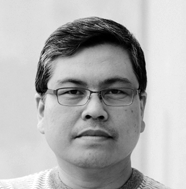The man sitting behind me
is telling the man sitting next to him about his heart bypass.
Outside the train’s window, the landscapes smear by—
the earnest, haphazard distillations of America. The backyards
and back sides of houses. The back lots of shops
and factories. The undersides of bridges. And then the
stretches
of actual land, which is not so much land
but the kinds of water courses and greenery that register
like luck in the mind. Dense walls of trees.
Punky little woods. The living continually out-growing
the fallen and decaying. The vines and ivies taking over
everything, proving that the force of disorder is also the force
of plenty. Then the eye dilating to the sudden
clearings—fields, meadows. The bogs that must have been left
by retreating glaciers. The creeks, the algae broth
of ponds. Then the broad silver of rivers, shiny
as turnstiles. Attrition, dispersal, growth—a system unfastened
to story, as though the green sight itself
was beyond story, was peacefully beyond any clear meaning.
But why the gust of alertness that comes
to me every time any indication of the human
passes into sight—like a mirror, like to like, even though I am
not
the summer backyard with the orange soccer ball resting
there, even though I am not the pick-up truck
parked in the back lot, its two doors opened
wide, and no one around to show whether it is funny
or an emergency that the truck is like that. Each thing looks
new
even when it is old and broken down.
They had to open me up—the man is now telling the other
man.
I wasn’t there to see it, but they opened me up.
Copyright © 2015 by Rick Barot. Used with permission of the author.
“Traveling the few hours from Tacoma to Portland, what I really wanted to do was read. But between the visual novelty from outside and the fragments of conversations I overheard inside, reading wasn’t going to happen. Instead, like any writer who realizes he or she is being given something, I started writing it all down.”
—Rick Barot

